Cultivating a unique sense of self-reliance through African mass food markets
After being shunned by formal financial institutions for decades, African SMEs and mass food markets have not run out of ideas. Mass market traders, vendors, transporters and small-scale food processors have developed strong relationship-based financial ecosystems, creating a self-contained economy that is able to fund itself without resorting to formal financial institutions.

Resilient financing models in African SMEs and mass food markets
While financial models among SMEs and mass food market economies have their own ceiling, they have managed to keep enterprises afloat. Such models include the following:
Own savings – SMEs, mass market traders and other actors have honed skills in developing their own savings and separating family requirements from business needs. Money generated from their businesses is often secured in commodity stocks like food and raw materials. Profits range from 10% to 50%, although the amounts can be considered small since they are able to procure small quantities of commodities per given time due to limited capital. However, this keeps the enterprises on course.
Agent model – Many traders have established strong relationships with farmers and that enables them to get commodities from farmers for free and trade on commission ranging from 5-10%. The process often sees traders collecting the produce from production areas or from farmers’ markets in cases where farmers bring commodities to the market. In the Zimbabwean mass market lingo, this arrangement is referred to as hallo. The hallo model is whereby traders get a portion of commodities from farmers to trade in the wholesale market while the same farmers will be trading the other part of the stock in the farmers’ market. At closure of the farmers’ market around mid-day, the farmer goes to the trader and say ‘hallo’ to collect income from sales of stocks collected by the trader before. A major limitation with this model is that traders are not guaranteed supplies from farmers especially if the commodity is on high demand and competitors are available to buy for cash directly from farmers.
Contract model – This whereby traders buy inputs for farmers to produce for them and then deduct the cost of inputs during sale of produce. This model guarantees supply of commodities to the trader but it leaves the trader with all the risk as he/she invests in both the market and production. If production is affected, for example by drought, the trader loses out on invested inputs.
‘Rounds’ model – This is where a group of up to 5 traders come together and make equal contributions say per day, per week or per month and take turns to take the contributed amount. This provides an opportunity for each member to buy meaningful stocks at once. However, the rounds are often disrupted if one member withdraws or fails to own-up the contribution to other members.
Short-term commodity loans – Each African mass food market has a class of traders who have capacity to purchase commodities in bulk from farmers. Some small-scale traders can then come and borrow some commodity stocks for on-ward selling and repay as they come to take more stocks. The commodity loans are settled by end of each day or the following day in the case of vendors who sell in residential areas. However, this model is unavailable if a commodity is in short supply and/or in high demand by cash buyers.
charles@knowledgetransafrica.com / charles@emkambo.co.zw / info@knowledgetransafrica.com
Website: www.emkambo.co.zw / www.knowledgetransafrica.com
Mobile: 0772 137 717/ 0774 430 309/ 0712 737 430
